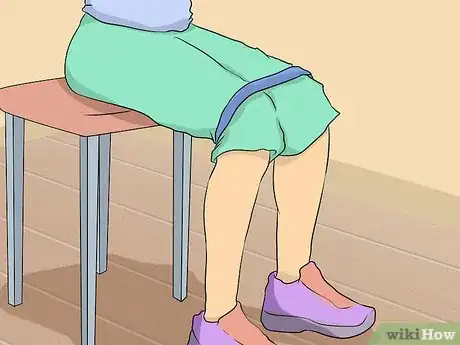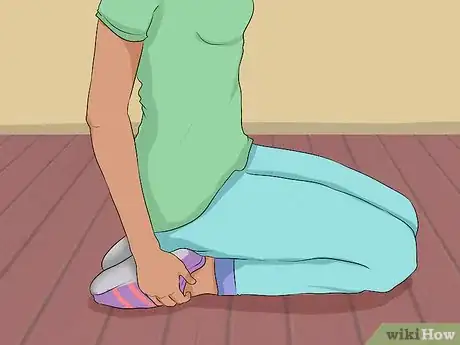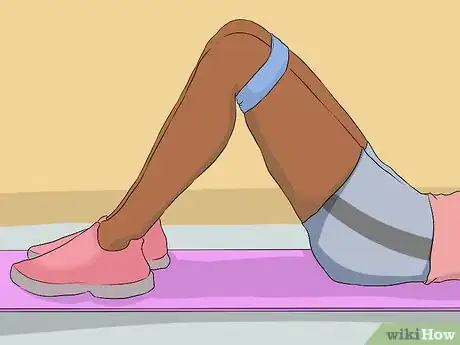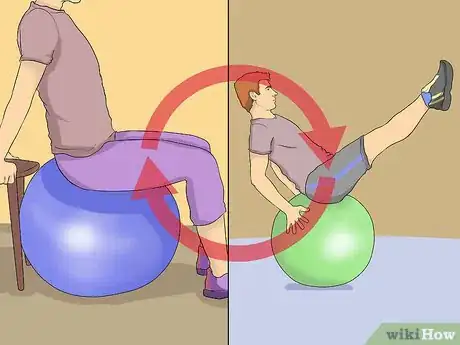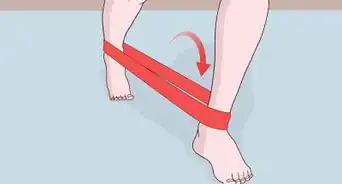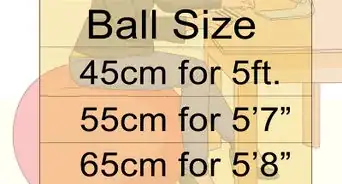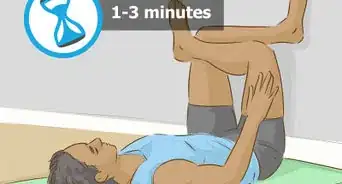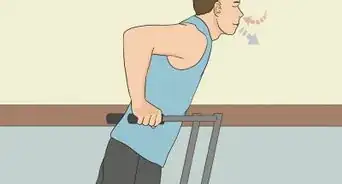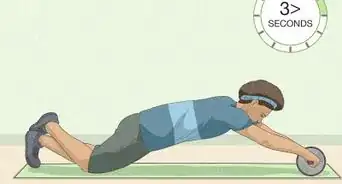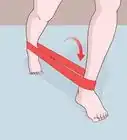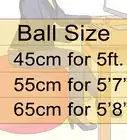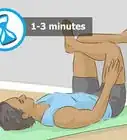This article was co-authored by Alphonso White. Alphonso White is a Certified Personal Trainer and Fitness Coach at CompleteBody in New York City. With over 20 years of experience in the personal fitness industry, Alphonso specializes in fat loss, toning, and functional training. As an ACE Certified Personal Trainer (ACE-CPT), he creates structured, personal workout plans geared towards short and long-term fitness goals. Alphonso also holds a BS in Nutrition and Exercise Science from Queens College and is a Black Belt in Seido Karate.
This article has been viewed 53,709 times.
Hip abductors are a group of muscles that are located on the outside of your hips and your butt.[1] Having strong abductor muscles helps keep your spine in line, can help you move more quickly from side to side (e.g. when playing basketball), and can be important for swimmers.[2] It can be tricky to target these muscles, but doing sitting abduction exercises can help.
Steps
Sitting in a Chair
-
1Sit in a chair with your knees bent. You want the chair to remain firmly in one place. Your feet should be planted on the floor, with your knees bent at ninety degrees.[3]
- Make sure the chair is not wobbly, and doesn’t rotate or have wheels (e.g. an office chair)
- If you are at the gym, you can sit on a weightlifting bench.
-
2Place an exercise band around your thighs. The exercise band should be placed behind your knees, on top of your clothing. The band should be tight enough so that it is challenging to pull your knees apart, but not so hard that you cannot perform the exercise.
- Alternatively, you can also create resistance using your hands. Simply make a fist with both hands and place each hand on the outside of each knee. For example, your left hand will be on the outside of your left knee, and the right hand will be on the outside of your right knee. Use the strength of your arms as resistance.
Advertisement -
3Press your knees outward. Take a breath in, and as you exhale, begin the exercise. try to push your knees apart, against the resistance bands for four seconds.[4] [5] Then, exhale as you release.
- Keep the muscles in your abdomen contracted while you do this exercise to keep your spine protected.
- Don’t hold your breath as you perform the exercise, as this may make you dizzy.
- You should try to press against the band so that you feel the outer muscles of your thigh contracting. It is not necessary to spread your legs as wide as they will go. If it is possible for you to do this, you might need to try a tighter resistance band.
-
4Repeat the exercise. You should try to do three sets of 15 repetitions.[6] This means that you will repeat the exercise 15 times, take a short break of a minute or so, and then repeat for two more sets of 15. You should aim to do this exercise three to five times per week.
- If you feel that this is too hard for you, then do as many as you can, and work your way up.
- As you get stronger, you can move to a tighter resistance band.
Using an Exercise Band
-
1Sit on the floor. Sit on your butt on the floor with your knees bent, feet flat on the floor, and your spine straight.[7]
- You will need to lean back a bit, and place your hands behind you for support. If you want to make it a bit harder, you can try to keep your hands off the floor to keep your ab muscles engaged.
-
2Place the band around your legs. The band should go over both of your legs, and should be placed behind your knees, about two inches up.[8]
- The band should be tight enough that it is challenging to push your knees away from each other, but not so difficult that you can’t move them with effort.
-
3Begin the exercise. With your spine straight, your chin up, and your abs tight, take a breath in, and as you exhale, press your knees away from each other.
- Press them far enough apart that you feel the muscles on the outer part of your thighs contracting.[9]
- Hold the exercise for four seconds, and as you release exhale.
- Do not hold your breath as this may make you feel dizzy!
-
4Repeat the exercise. If it is your first time doing the exercise, you may only be able to repeat the exercise a few times; however, as you get stronger, you should aim for three sets of 15 reps.[10] Try to do this exercise three to five times each week.
- Therefore, you should do the exercise 15 times, stop for a little break, and then repeat another 15 times. Then, take another break, and repeat again 15 times.
Sitting on a Ball
-
1Sit on a ball. For this method, you will need a Swiss ball to sit on, typically between 14 to 20 inches (36 to 51 cm) in diameter. Place the ball on an exercise mat, and sit down carefully on it.[11]
-
2Use your hands for support. It will be very difficult to balance on the ball without support, so place your hands behind you on the floor, a bit wider than shoulder width apart.[12]
- If it is difficult for you to do this, you can also rest your hands on a short bench, placed behind you.
- You might also try using yoga blocks to rest your hands on.
-
3Begin the exercise. With your abdominal muscles contracted, and your spine straight, lift your legs straight into the air until your body makes a “V” shape. Take a breath in, and as you inhale, slowly open your legs. You should feel the outer muscles of your thighs contracting.
- Exhale as you bring your legs back together.
-
4Repeat. You should repeat the exercise for three sets of 15 repetitions.[13] Repeat this exercise three to five times each week for best results.
- If this is very difficult for you, try starting off by sitting on the floor and work up to sitting on the ball.
Expert Q&A
-
QuestionWhere do you put the resistance bands for a sitting abductor exercise?
 Alphonso WhiteAlphonso White is a Certified Personal Trainer and Fitness Coach at CompleteBody in New York City. With over 20 years of experience in the personal fitness industry, Alphonso specializes in fat loss, toning, and functional training. As an ACE Certified Personal Trainer (ACE-CPT), he creates structured, personal workout plans geared towards short and long-term fitness goals. Alphonso also holds a BS in Nutrition and Exercise Science from Queens College and is a Black Belt in Seido Karate.
Alphonso WhiteAlphonso White is a Certified Personal Trainer and Fitness Coach at CompleteBody in New York City. With over 20 years of experience in the personal fitness industry, Alphonso specializes in fat loss, toning, and functional training. As an ACE Certified Personal Trainer (ACE-CPT), he creates structured, personal workout plans geared towards short and long-term fitness goals. Alphonso also holds a BS in Nutrition and Exercise Science from Queens College and is a Black Belt in Seido Karate.
Certified Personal Trainer, CompleteBody NYC Place the exercise band around your lower thighs, just above your knees. Then, press your legs outward.
Place the exercise band around your lower thighs, just above your knees. Then, press your legs outward.
Warnings
- If you are new to exercising, it may be a good idea to get some help from a personal trainer, at least at first. If you do this exercise incorrectly, you could injure yourself.⧼thumbs_response⧽
References
- ↑ http://www.athleticquickness.com/hipabductors.asp
- ↑ http://www.athleticquickness.com/hipabductors.asp
- ↑ http://www.sportsinjuryclinic.net/rehabilitation-exercises/hip-groin-exercises
- ↑ Alphonso White. Certified Personal Trainer, CompleteBody NYC. Expert Interview. 24 February 2021.
- ↑ http://www.sportsinjuryclinic.net/rehabilitation-exercises/hip-groin-exercises
- ↑ http://www.sportsinjuryclinic.net/rehabilitation-exercises/hip-groin-exercises
- ↑ http://www.sportsinjuryclinic.net/rehabilitation-exercises/hip-groin-exercises
- ↑ http://www.sportsinjuryclinic.net/rehabilitation-exercises/hip-groin-exercises
- ↑ http://www.sportsinjuryclinic.net/rehabilitation-exercises/hip-groin-exercises
- ↑ http://www.sportsinjuryclinic.net/rehabilitation-exercises/hip-groin-exercises
- ↑ http://www.sportsinjuryclinic.net/rehabilitation-exercises/hip-groin-exercises
- ↑ http://www.sportsinjuryclinic.net/rehabilitation-exercises/hip-groin-exercises
- ↑ http://www.sportsinjuryclinic.net/rehabilitation-exercises/hip-groin-exercises

